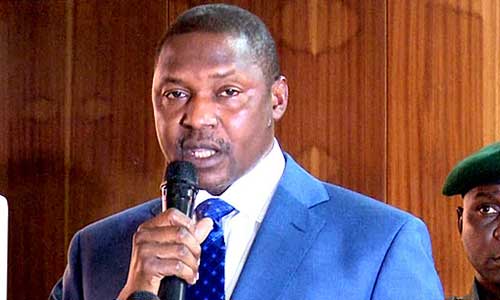Inspired by the need to eliminate torture, cruel, inhuman and degrading treatment in the country, the federal government recently inaugurated the National Committee Against Torture (NCAT).
Inaugurating the committee, the Attorney General of the Federation (AGF), Abubakar Malami, said members are expected to play a crucial role in stamping out torture and other related vices to ensure justice for survivors and victims.
- Rejection of Nigeria’s food items abroad worrisome – FG
- NIGERIA DAILY: How The NDLEA Intends To Dispose The Largest Bust Of Cocaine
He told members that the committee was empowered to liaise with the National Human Rights Commission (NHRC) in discharging its mandate, particularly as it concerned visits to the facilities of the Nigerian Correctional Service (NCoS), which he said would avail it first-hand information on the conditions of inmates.
Speaking at the inauguration, the Solicitor General of the Federation and Chairperson of NCAT, Beatrice Jedy Agba, pledged the committee’s commitment to satisfactorily implement its terms of reference.
Commenting on the committee’s secretariat being domiciled at NHRC, the Executive Secretary of NHRC, Tony Ojukwu, who is the alternate chairman of the committee, said the idea of NHRC hosting the committee’s secretariat was in line with international best practices, adding that the committee would collaborate with relevant Ministries, Departments and Agencies (MDAs), including the Nigerian Bar Association (NBA) and Civil Society Organisations (CSOs).
The NCAT comprises members from the Federal Ministry of Justice, NHRC, army, police, Legal Aid Council (LAC) and NCoS. Others are the Nigeria Security and Civil Defence Corps (NSCDC), Economic and Financial Crimes Commission (EFCC), Department of State Services (DSS), NBA, among others.
NCAT’s terms of reference include receiving and considering communications on torture from individuals, CSOs and government institutions; ensuring that education and information regarding the prohibition against torture are fully included in the training of law enforcement and public officers, fostering and leading consultations for reporting on torture and follow up with NHRC, CSOs and other relevant bodies.
It would be recalled that the United Nations (UN) Convention Against Torture and Other Cruel, Inhuman or Degrading Treatment or Punishment, to which Nigeria is a signatory, was adopted on December 10, 1984, by the General Assembly Resolution 39/46, which entered into force on June 26, 1987, in accordance with Article 27(1). While Article 2(2) affirms that neither a state of war nor its threat or internal political instability or any other public emergency may be invoked as a justification for torture, it prohibits the use of an order from a superior officer or a public authority as a justification for it. The convention requires each state party to ensure that all acts of torture are captured as offences under its criminal law in addition to making them punishable with appropriate penalties.
The inhuman handling of suspects by most security personnel in the country, however, negates the UN’s convention against torture. Regrettably, cruel treatment of suspects has become part of detention procedures in many of our custodial facilities. Some influential persons procure torture from corrupt security personnel who, having been paid, prejudicially subject citizens to brutality. Security personnel and bidders of torture both get away with their crimes due to the weak mechanisms for preventing and dealing with torture within the system.
While we commend government’s effort at stemming the tide of torture and inhuman treatment of citizens through NCAT, we believe the committee would have been unnecessary if existing human rights and law enforcement agencies had not failed in their respective mandates on preventing human rights violations. The fact that the committee has its members drawn from agencies with core mandate on human rights does not only expose the irony in its composition, but further provides basis for interrogating its creation.
There wouldn’t have been any need for NCAT if, as required by Article 10 of the UN convention, law enforcement personnel in the armed forces, police and other para-military services had received appropriate training on how to handle citizens with utmost civility when they are in custody as suspects or convicts.
Coming at a time when government is about implementing the Orosanya Report which recommends the rationalisation of over 400 MDAs, NCAT shouldn’t have been a priority now. But now that it has been constituted, we urge it to carry out its duties optimally.
While we call on government to enforce the law against torture, we advise that law enforcement personnel (civil or military), medical personnel and public officials who may be involved in the custody, interrogation or treatment of any individual subjected to any form of arrest, detention or imprisonment are properly educated on the law prohibiting torture. Perpetrators, particularly from among security personnel, should be seen to be prosecuted. In fact, the lack of prosecution and punishment of law enforcement officers accused of torture or human rights violations is one of the reasons this act persists in the country.
Daily Trust further calls on law enforcement agencies to ensure that complainants and witnesses in cases of torture are protected against ill-treatment or intimidation as a consequence of the complaints or evidences given. It would only be fair that victims of torture are adequately compensated. We believe that if agencies spend a lot of money on compensation, their authourities will ensure that the act is reduced or stopped.

 Join Daily Trust WhatsApp Community For Quick Access To News and Happenings Around You.
Join Daily Trust WhatsApp Community For Quick Access To News and Happenings Around You.


